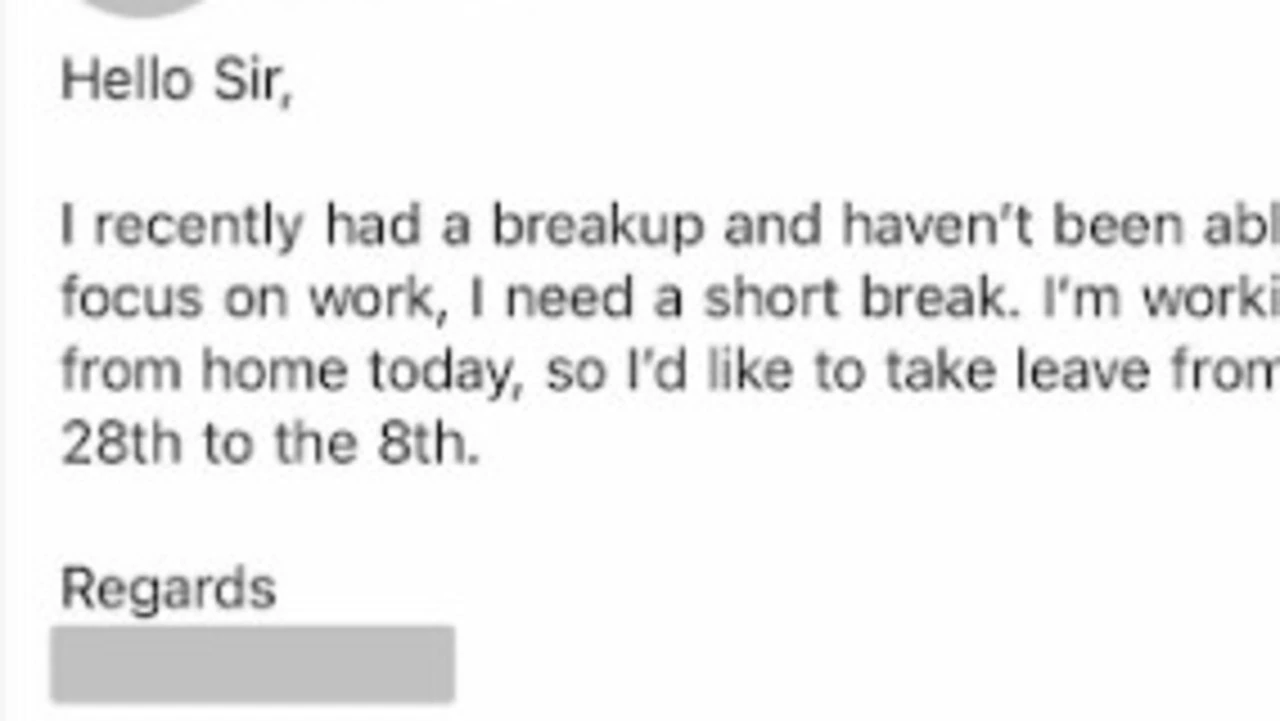Copyright news

Jasveer Singh, the CEO of Knot Dating, an AI matchmaking App, took to X to share a screenshot of an email from a young staff member. He blocked out the name of the employee to protect their privacy. “I recently had a break-up and haven’t been able to focus on work. I need a short break. I’m working from home today, so I’d like to take leave from the 28th to the 8th,” the email reads. That one email request asking for 10 days of annual leave has now been seen a staggering 14 million times. Mr Singh shared that he approved the leave instantly and without any further questions and the CEO argued that relationship breakups when you are young can be worse than divorce. “Got the most honest leave application yesterday. Gen Z doesn’t do filters,” he wrote. MORE: 8 things you didn’t know you could be fired for Online, people were divided by the work request, who many speculated had been sent from a man, although this was not confirmed. Some found it refreshing to see an employee being so transparent, while others thought it was unprofessional. “I respect the honesty and sometimes a break-up hurts more than a deadline,” one commented. Someone else argued that honesty is one of the best traits of Generation Z, and proved that they are more “emotionally honest”, which is a good thing. Another argued we should “normalise office leave for breakups” and one social media user said they found the email amusing, writing that it “cracked me up”. Not everyone was so on board, though. One social media commenter said the employee’s leave request should be “rejected” and they should be asked to work, which would distract the individual from the break-up. “Instant rejection. Your personal life is not my business. Deal with your break-up in your home hours, this isn’t your family member dying,” someone else argued. “Just fire him. So that he can rest enough,” another suggested. “Man up,” someone else demanded. MORE: Know your rights: Can I be fired on probation? Workplace expert Roxanne Calder told news.com.au that she isn’t even remotely surprised to see an email from a Gen Z individual taking leave due to heartbreak. Ms Calder explained that Aussie workplace culture has become rife with “oversharing,” and that doesn’t always have to be a bad thing. However, the problem with this email is that the worker isn’t asking for leave, but rather telling their boss they’re taking leave. “There is oversharing and a transfer of responsibility, where it becomes someone else’s problem, and Gen Z is saying, ‘you must understand,’” she said. “There are expectations and there is no asking.” Ms Calder said the issue has become that Gen Z doesn’t ask for things in the workplace but rather makes assumptions, and Gen Z thinks everything is about setting boundaries. “Gen Z think they are putting boundaries in place when they are actually creating barriers. Making a statement like that does not help you and it is not an appropriate boundary,” she said. “They need to work on communication and learn what not to communicate and how to communicate emotion, but in the right way, like showing they are grateful or thankful.” Ms Calder said generally speaking, if you’re taking personal leave for an extended period of time, you’re not required to tell your boss why but your employer can ask for reasonable supporting evidence. In some cases, employers may request a doctor’s certificate or a statutory declaration. The workplace expert argued that the email reads “entitled” because the employee isn’t asking if the leave is even possible. Ms Calder believes the fault doesn’t lie with Gen Z, but rather with their Gen X parents and managers, who aren’t teaching them. “It sits with their parents and managers to show them differently, for instance, if I received that email, I’d go back to them and say ‘I’m sorry to hear that’ and ask if we can speak on the phone,” she said. She’d then gauge how they were doing and, if they were clearly upset, she’d grant the leave. Then, when they return from leave, she would have a conversation with them on how to better ask for leave in the future. “I’d say that ‘this isn’t the way to go about it, and next time we are going to do it like this,’” she said. Ms Calder argued it isn’t about denying the leave but rather getting Gen Z to work on professional communication. Similarly, PR boss Roxy Jacenko, who has previously slammed Australian workers for becoming lazy, said the problem with the email is that the worker wasn’t asking. Ms Jacenko said that email is a prime example of the fact that times have changed and common courtesy is not that common anymore. “What would bother me is the ‘this is what I’m doing’, rather than the courtesy of saying this is where I’m at, I’m not performing the way I want to be for the business,” she told news.com.au. “I don’t know that it’s entitled, it’s more so just that times have changed and the simple courtesy of asking and discussing has been forgotten about.” Jacenko noted though that there’s nothing wrong with being “open and candid” about how you are feeling with your employer. “It is a good thing as it allows an employer to understand and appreciate where you’re at and accommodate you better so as a team the business is in the best possible position,” she said. However, it just comes down to asking, not demanding.



